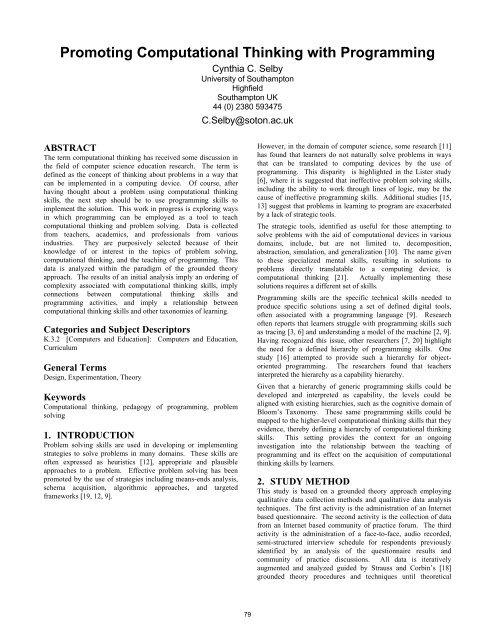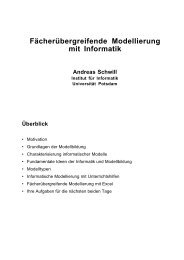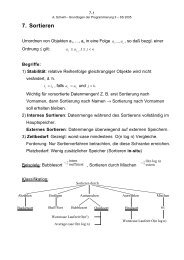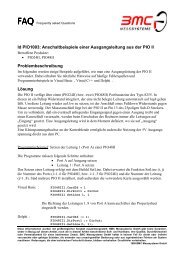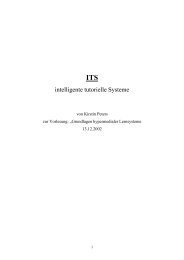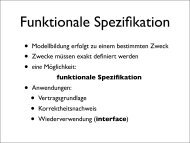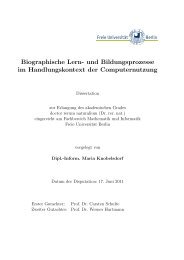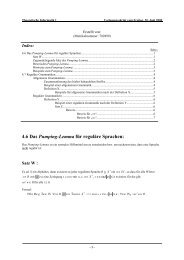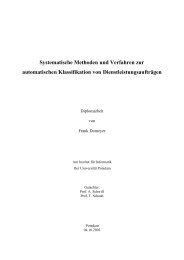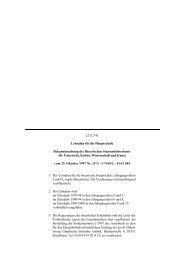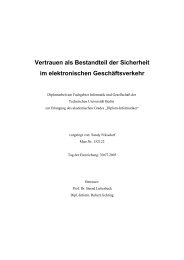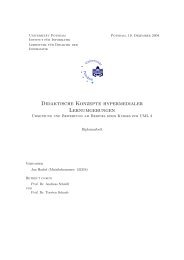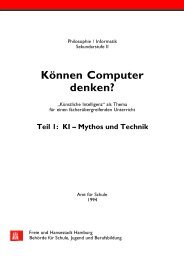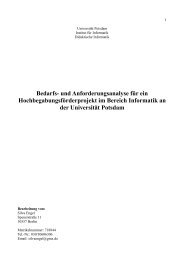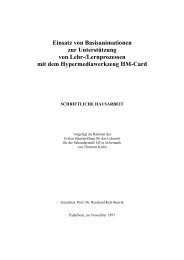Maria Knobelsdorf, University of Dortmund, Germany - Didaktik der ...
Maria Knobelsdorf, University of Dortmund, Germany - Didaktik der ...
Maria Knobelsdorf, University of Dortmund, Germany - Didaktik der ...
You also want an ePaper? Increase the reach of your titles
YUMPU automatically turns print PDFs into web optimized ePapers that Google loves.
Promoting Computational Thinking with Programming<br />
Cynthia C. Selby<br />
<strong>University</strong> <strong>of</strong> Southampton<br />
Highfield<br />
Southampton UK<br />
44 (0) 2380 593475<br />
ABSTRACT<br />
The term computational thinking has received some discussion in<br />
the field <strong>of</strong> computer science education research. The term is<br />
defined as the concept <strong>of</strong> thinking about problems in a way that<br />
can be implemented in a computing device. Of course, after<br />
having thought about a problem using computational thinking<br />
skills, the next step should be to use programming skills to<br />
implement the solution. This work in progress is exploring ways<br />
in which programming can be employed as a tool to teach<br />
computational thinking and problem solving. Data is collected<br />
from teachers, academics, and pr<strong>of</strong>essionals from various<br />
industries. They are purposively selected because <strong>of</strong> their<br />
knowledge <strong>of</strong> or interest in the topics <strong>of</strong> problem solving,<br />
computational thinking, and the teaching <strong>of</strong> programming. This<br />
data is analyzed within the paradigm <strong>of</strong> the grounded theory<br />
approach. The results <strong>of</strong> an initial analysis imply an or<strong>der</strong>ing <strong>of</strong><br />
complexity associated with computational thinking skills, imply<br />
connections between computational thinking skills and<br />
programming activities, and imply a relationship between<br />
computational thinking skills and other taxonomies <strong>of</strong> learning.<br />
Categories and Subject Descriptors<br />
K.3.2 [Computers and Education]: Computers and Education,<br />
Curriculum<br />
General Terms<br />
Design, Experimentation, Theory<br />
Keywords<br />
Computational thinking, pedagogy <strong>of</strong> programming, problem<br />
solving<br />
1. INTRODUCTION<br />
Problem solving skills are used in developing or implementing<br />
strategies to solve problems in many domains. These skills are<br />
<strong>of</strong>ten expressed as heuristics [12], appropriate and plausible<br />
approaches to a problem. Effective problem solving has been<br />
promoted by the use <strong>of</strong> strategies including means-ends analysis,<br />
schema acquisition, algorithmic approaches, and targeted<br />
frameworks [19, 12, 9].<br />
C.Selby@soton.ac.uk<br />
79<br />
However, in the domain <strong>of</strong> computer science, some research [11]<br />
has found that learners do not naturally solve problems in ways<br />
that can be translated to computing devices by the use <strong>of</strong><br />
programming. This disparity is highlighted in the Lister study<br />
[6], where it is suggested that ineffective problem solving skills,<br />
including the ability to work through lines <strong>of</strong> logic, may be the<br />
cause <strong>of</strong> ineffective programming skills. Additional studies [15,<br />
13] suggest that problems in learning to program are exacerbated<br />
by a lack <strong>of</strong> strategic tools.<br />
The strategic tools, identified as useful for those attempting to<br />
solve problems with the aid <strong>of</strong> computational devices in various<br />
domains, include, but are not limited to, decomposition,<br />
abstraction, simulation, and generalization [10]. The name given<br />
to these specialized mental skills, resulting in solutions to<br />
problems directly translatable to a computing device, is<br />
computational thinking [21]. Actually implementing these<br />
solutions requires a different set <strong>of</strong> skills.<br />
Programming skills are the specific technical skills needed to<br />
produce specific solutions using a set <strong>of</strong> defined digital tools,<br />
<strong>of</strong>ten associated with a programming language [9]. Research<br />
<strong>of</strong>ten reports that learners struggle with programming skills such<br />
as tracing [3, 6] and un<strong>der</strong>standing a model <strong>of</strong> the machine [2, 9].<br />
Having recognized this issue, other researchers [7, 20] highlight<br />
the need for a defined hierarchy <strong>of</strong> programming skills. One<br />
study [16] attempted to provide such a hierarchy for objectoriented<br />
programming. The researchers found that teachers<br />
interpreted the hierarchy as a capability hierarchy.<br />
Given that a hierarchy <strong>of</strong> generic programming skills could be<br />
developed and interpreted as capability, the levels could be<br />
aligned with existing hierarchies, such as the cognitive domain <strong>of</strong><br />
Bloom’s Taxonomy. These same programming skills could be<br />
mapped to the higher-level computational thinking skills that they<br />
evidence, thereby defining a hierarchy <strong>of</strong> computational thinking<br />
skills. This setting provides the context for an ongoing<br />
investigation into the relationship between the teaching <strong>of</strong><br />
programming and its effect on the acquisition <strong>of</strong> computational<br />
thinking skills by learners.<br />
2. STUDY METHOD<br />
This study is based on a grounded theory approach employing<br />
qualitative data collection methods and qualitative data analysis<br />
techniques. The first activity is the administration <strong>of</strong> an Internet<br />
based questionnaire. The second activity is the collection <strong>of</strong> data<br />
from an Internet based community <strong>of</strong> practice forum. The third<br />
activity is the administration <strong>of</strong> a face-to-face, audio recorded,<br />
semi-structured interview schedule for respondents previously<br />
identified by an analysis <strong>of</strong> the questionnaire results and<br />
community <strong>of</strong> practice discussions. All data is iteratively<br />
augmented and analyzed guided by Strauss and Corbin’s [18]<br />
grounded theory procedures and techniques until theoretical


